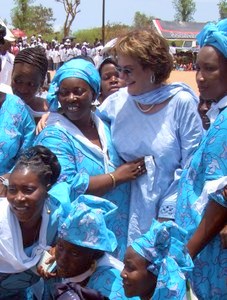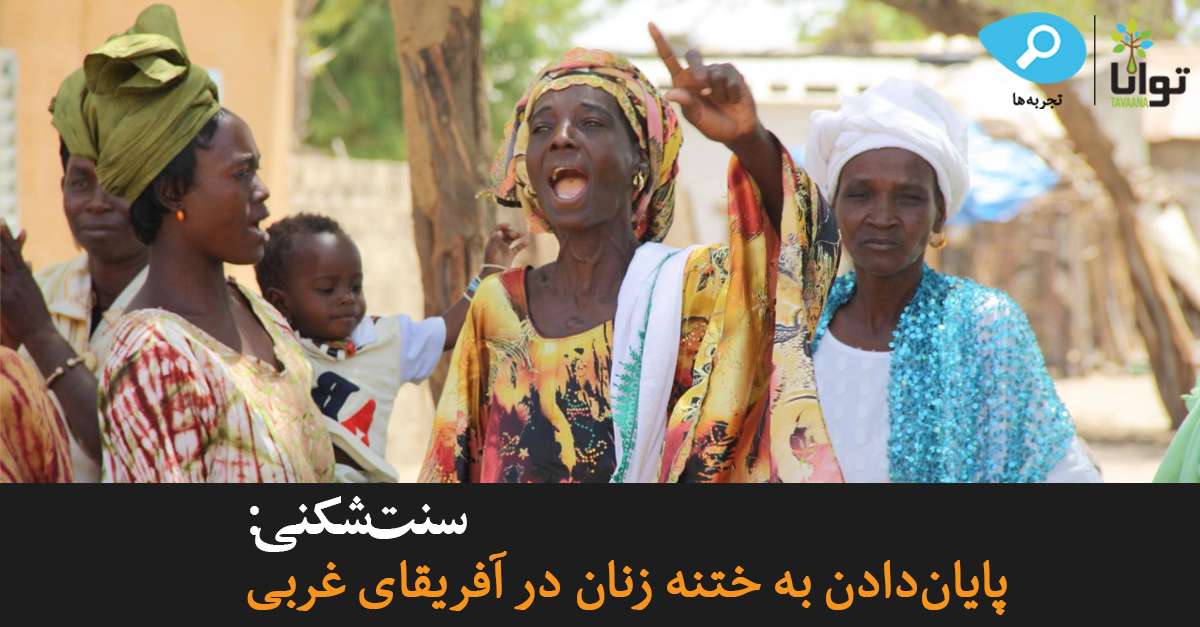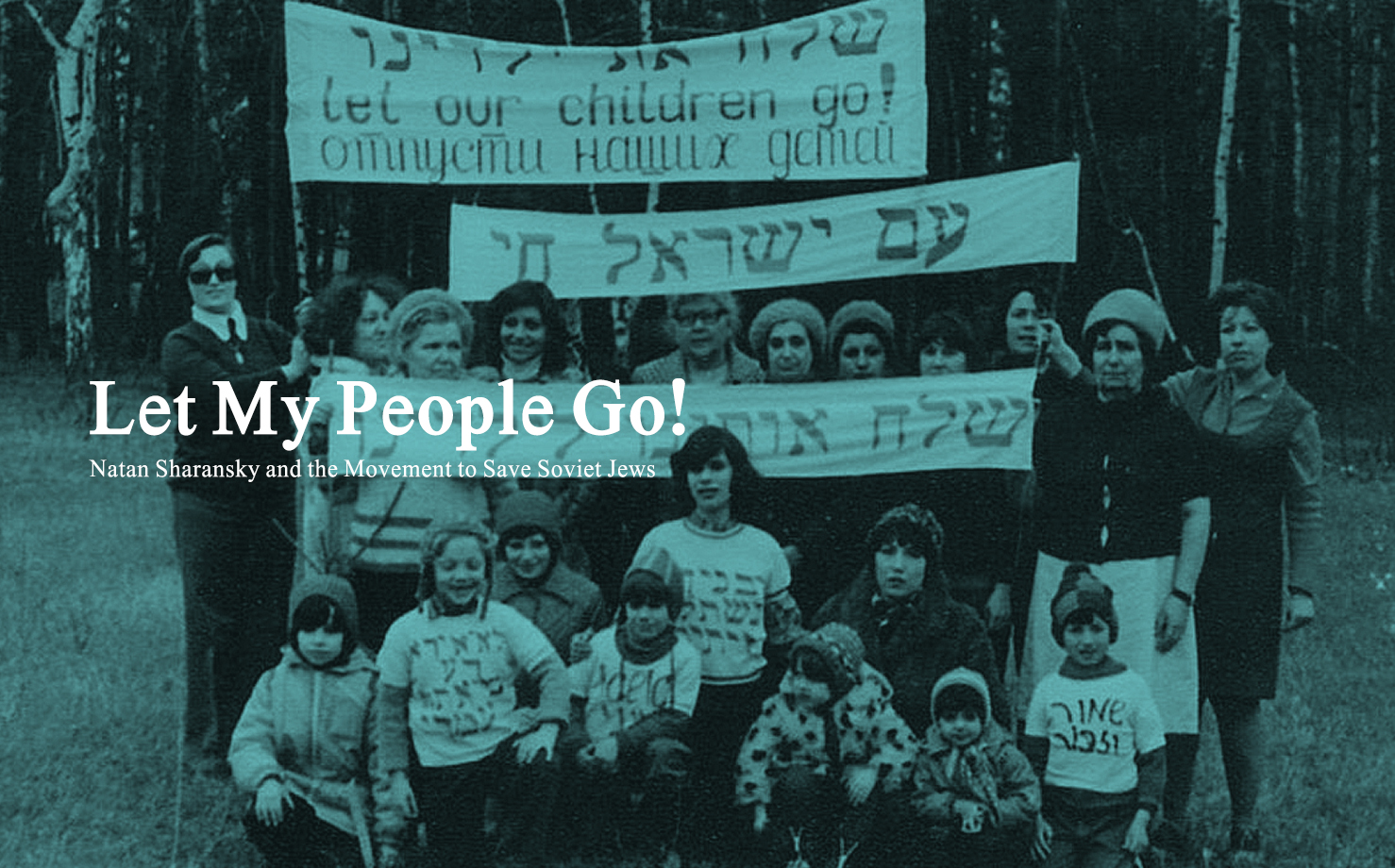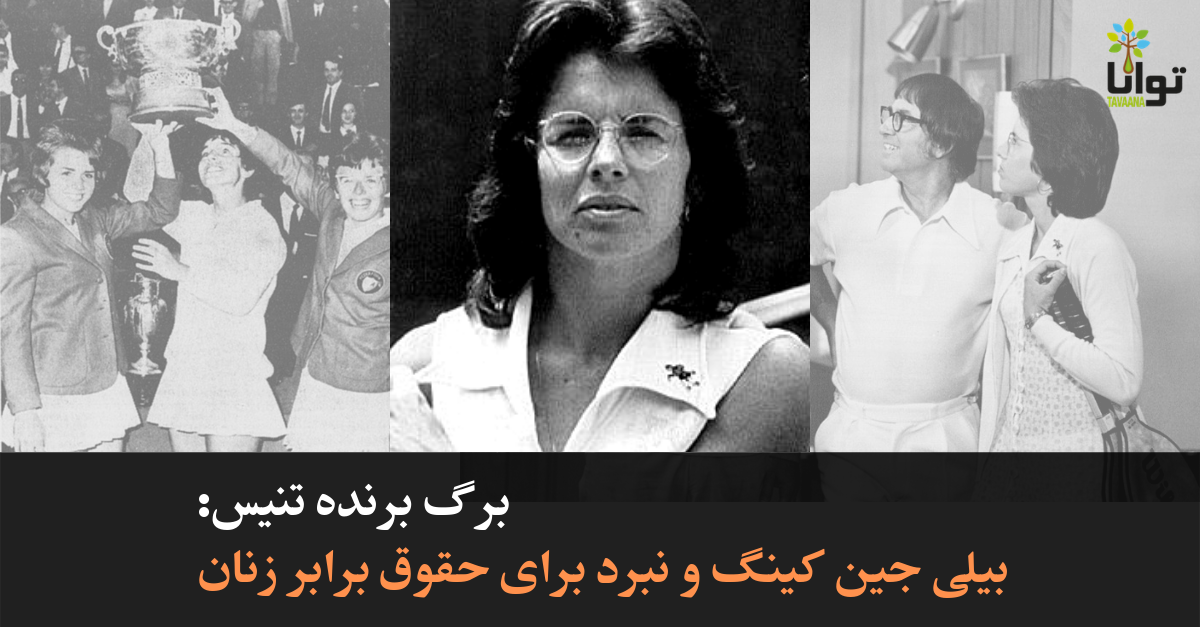At age 10, Mariam eagerly anticipated her West African village’s traditional initiation ceremony. “[I was told that] at a great festivity I should be initiated together with all the other girls of my age, and we would receive a lot of beautiful gifts.”[1] But what happened that day was the beginning of an ordeal that would change Mariam’s life for years to come. Mariam and the other girls of her village were forced to undergo a procedure known as female genital cutting (FGC), in which some or all of the external female genitalia are ritually removed.

“I felt an intense pain,” Mariam recounts. “I saw blood running from between my legs and I lost consciousness…I didn’t stop bleeding for the whole day.”[2] For weeks following the procedure she was violently ill. Then, at the age of 13, Mariam was married off to an older man. As she had been “sewn up” in a particularly invasive form of female genital cutting called infibulation, on the evening of her wedding “elderly women came…and took the stitches away before handing [her] to [her] husband for him to accomplish his duty.”[3] That night she felt the same trauma and suffering as the day she underwent FGC; for a week after she could not move because of the intense pain. She fell pregnant immediately but due to the complications of FGC, her child died at birth and Mariam suffered from obstetric fistula. Two years later, with the assistance of an organization working against female genital cutting, Mariam was treated for the medical issues she experienced as a result of FGC, and has since remarried and given birth to a daughter. Today, Mariam is an advocate for the abandonment of female genital cutting: “I am prepared to fight for my [daughter’s] rights, so that she will not become a victim of mutilation.”[4]
Vision and Motivation
Defined as any procedure that “alters or injures the female genital organs for non-medical reasons,”[5] more than 125 million girls and women have undergone some sort of female genital cutting, primarily in 29 countries in Africa and the Middle East.[6] Despite the grave danger to a girl’s health, the practice continues in communities for cultural or religious reasons; in West Africa, it is considered a traditional rite of passage that confers social status, can determine marriageability, and is sometimes believed to be a religious duty.[7] In actuality, the process controls the sexuality of women and girls and endangers their lives. Performed in unhygienic conditions with unsterilized blades, the girls who survive the initial cutting are at risk of long-term health consequences, including infertility, obstetric fistula, and childbirth complications. Some die.

In the West African country of Senegal, a quarter of girls and women aged 15-49 have undergone FGC.[8] Since the early 1980s, local organizations, the national government, and international donor agencies have been involved in bringing an end to FGC in the country. One organization leading the crusade against FGC is Tostan. Meaning “breakthrough” in Wolof, the predominant language of Senegal, Tostan approaches the issue of FGC as a human rights violation, working to raise awareness among community members of the health consequences of the practice by encouraging discussion and consensus-building among community members. As a result, communities decide on their own volition to abandon the practice. In Senegal today, the movement to end genital cutting is rapidly spreading “through the very ties of family and ethnicity that used to entrench it.”[9]
Goals and Objectives

The fight to end female genital cutting in Senegal began in a single village. In 1997, the women of the village of Malicounda Bambara learned about the health risks of FGC through an education program organized by Tostan.[10] Discussion about abandoning the traditional practice began among these women, then with their husbands, and finally reached the village chief. Fearing the consequences to the health of the village’s women and girls, the Muslim-majority community decided they would end the practice of FGC as long as it were not considered an obligatory practice according to the Qur’an.[11] They consulted their local imam, Demba Diawara, who ultimately determined that FGC was not an obligation in Islam.[12] Soon after, Malicounda Bambara became the first village in Senegal to publicly announce the abandonment of FGC.
Inspired by his community’s “breakthrough,” Imam Diawara wanted to do more. After participating in the Tostan education program, he attested, “we all came to the conclusion that many of the health problems of our girls came from FGC. We were determined to end the source of our problems and improve the overall health of the community.”[13] But Imam Diawara realized that the abandonment of FGC by one village alone was not enough. Walking from village to village, the imam personally worked to raise awareness and educate nearby communities on the dangers of FGC. Thanks to his efforts, ten villages pledged to abandon FGC in what is believed to be Africa’s first collective abandonment of the practice.[14]
ImamDiawara’s commitment exemplifies Tostan’s mission, which envisions “a world where everyone is treated equally and respectfully, where they are able to live a life free from harm [and] where they have the tools they need to determine their own future and fulfill their potential.”[15] Community responsibility to help uphold individual rights is a central component of Tostan’s work; Tostan’s signature community empowerment program asks both men and women to envision their own future and that of their community, and curriculum is adapted to the goals and aspirations shared by community members. By providing participants with the information they need to make an educated decision, Tostan ensures that a community’s declaration to abandon FGC is both highly meaningful and enduring.
Leadership
Tostan’s founder, Molly Melching, is an American who has lived and worked in Senegal since 1974. A student at the University of Dakar, and later a Peace Corps volunteer working with NGOs throughout the country, Melching recognized that “many development efforts were not addressing the true needs and realities of African communities.”[16] In the 1980s, Melching worked with her Senegalese team to develop a non-formal education program for rural communities, which would actively engage community members and harness traditional African culture, tradition, and methods of learning. In 1991 Tostan was founded based on the model she developed during those years.
It is the leadership of local leaders, however, that is key to the organization’s success. As Melching notes, “community members are the ones leading this movement for change, and I think this is a critical lesson in this whole process.”[17] Tostan aims to work within the context of the local culture and thus depends on local leaders to mobilize their communities, especially through democratically elected community management committees that Tostan trains. These committees coordinate and manage development activities and are comprised of leaders of all ages and social status, including both religious and traditional leaders, as well as those often marginalized in communities. In fact, 9 of the 17 community management committee members must be women.[18] By taking on this prominent role, women are recognized as leaders, improving their ability to shape the community’s priorities. Together, the committee can address issues and develop solutions in the interest of the entire community, not simply the traditionally powerful. According to Melching, “When people make these decisions to really embrace human rights together as a community and as a extended community, you see all kinds of changes happening.”[19]
Civic Environment
Senegal is considered one of the most stable countries in Africa and has a multi-party democratic system. Its democratic institutions have strengthened considerably since the nation gained its independence from France in 1960,[20] avoiding much of the instability and violence suffered by its West African neighbors; Senegal’s 2012 presidential elections, in which an incumbent peacefully conceded his presidency to his opponent, were hailed as a sign of the country’s democratic maturity. Though the country is still ailed by corruption and a lack of transparency in many sectors,[21] Senegal tackles these challenges through a democratic culture and a vibrant civil society. Familiarity with civic organizations and community organizing is a benefit to Tostan’s work, as people embrace the exchange of ideas, debate, and democratic practices key to the organization’s success.
The Senegalese people are known for their adherence to kersa, meaning respect for others. Senegal’s open and tolerant social life balances its profound religious currents with secular governance institutions. 95% of Senegalese people belong to one of the country’s three Muslim brotherhoods. The form of Sufi Islam practiced by most Senegalese Muslims promotes open-mindedness and acceptance[22] and fosters respect “by emphasizing those parts of the Qur’an’s that urge tolerance as a response to diversity.”[23] Such characteristics help to cultivate a religious and cultural environment that is receptive to moderation, change, and social justice.
Both the Senegalese government and religious leaders have been allies in the fight against FGC. In February of 1998, Senegal’s president Abdou Diouf brought forth a law that made the practice illegal and punishable by one to five years in prison. However, resistance persists. Conservative communities, particularly in the north of the country, continue to cling to their “tradition.” In 2009, a powerful family in northern Senegal demanded the law prohibiting FGC be repealed; their demand was supported by 200 marabouts, or Islamic religious leaders.[24] While the controversy received significant media coverage, secular law triumphed and as a result, people began to recognize the legitimacy of the FGC ban nationwide.
Message and Audience
While Tostan posits FGC is hazardous for an individual’s health and a violation of human rights, the organization ultimately believe that communities must come to this conclusion of their own volition. Tostan provides information about the negative health consequences of FGC in a comprehensive education program administered to communities over a one-year period. As Fatou Diakhate, a participant of Tostan’s community empowerment program, explained,  “the Tostan education program helped us to make the connection between FGC and its harmful effects. The program also made us aware of our human rights and responsibilities.”[25]
“the Tostan education program helped us to make the connection between FGC and its harmful effects. The program also made us aware of our human rights and responsibilities.”[25]
This awareness is a product of two distinct stages of learning. Kobi, which means “to prepare the planting,” is the first stage; it includes oral lessons on civic responsibility, problem solving, healthy living, human rights, and democracy.[26] As Melching explained, “knowing your rights and knowing that you have the right to even speak out and say, ‘this is wrong’” is the first step in this process.[27] Community leaders, including religious leaders, are integral to this process.[28] When addressing sensitive topics, such as female genital cutting, a local imam can be an invaluable ally.
The second phase of the community empowerment program is called Aawde, which means, “to plant the seed.”[29] In this phase, participants work to develop skills in literacy, math, and project management, all tools that can help them foster positive change in their lives and in their community. Tostan also organizes forums to facilitate discussion amongst community members. These forums provide a space for youth, adults, men, women, and people of every sector and social standing, to discuss on equal footing the issues that their community confronts and to develop solutions together. Based on community member consensus, plans for action are organized and managed by a democratically elected community management committee.[30]
This process has been replicated in villages in Senegal and beyond; today over 7,000 communities throughout Africa have come to a consensus to abandon FGC.[31] Not only have participants discovered alternatives to FGC, but they have also unified as a community, and gained the confidence and skills to make change. As Tostan founder Molly Melching notes, “We have learned many things through our 20 years at Tostan, but none as important as how human rights in a non-formal education program can empower people to positively transform their communities and their lives.”[32]
Once a community has decided to abandon FGC, it makes a public, united declaration of their pledge. Program Director of Tostan Senegal, Khalaidou Sy, notes, “Because FGC is generally linked to marriage and social status, abandonment requires a collective decision by the whole intra-marrying group. The public declaration offers a way for people to have that collective commitment.”[33] This step is critical because it “allows people to agree collectively to halt the practice of FGC so that no one family stands out or no one is socially stigmatized.”[34] Public declarations have become a new tradition for the village, with ceremonies including traditional storytelling and plays staging the dangers of cutting performed by the village’s children.[35] As Tostan notes, “Communities in Senegal are bound by the weight of their words – making announcement in a public setting reflects endorsement of the new social norm.”[36]
The event surrounding a public declaration to abandon FGC garners significant media attention, which promotes discussion about FGC more widely. However, the most important way that knowledge about FGC spreads is through word of mouth. To reach a critical mass of individuals and communities, Tostan relies on “organized diffusion.”[37] Every participant in the community empowerment program is expected to teach the information they learn in Tostan sessions to a friend or neighbor. Then the entire village is encouraged to engage with neighboring villages, organizing meetings to spread the information they have learned, a task participants embrace with zeal.
Recognizing the importance of involving all members of a social network to achieve sustainable social change, Tostan also facilitates discussions in border areas, as well as between communities in Senegal and the diaspora. “Even though our villages seem small, behind each village are many other villages,” notes Imam Diawara.[38] This method has seen great success in West Africa; since the beginning of the program, Tostan’s teachings on human rights have reached over three million people.[39]
Outreach Activities
The movement to end female genital cutting in Senegal has taken root at the local, national, and international level. In country, Tostan reinforces their work by partnering with NGOs working in the same region and with local authorities by sharing their mission and development method through seminars and informational meetings. This networking has encouraged leaders at the local and national level to come together to call for an end to FGC and to help encourage public dialogue on the issue. Just a year after the first Senegalese village announced its pledge to abandon FGC, a law was enacted prohibiting the practice. In cooperation with its citizens and organizations like Tostan, the Senegalese government continues to actively work to eliminate FGC from the country with promising results; it is expected by 2017, FGC will be eradicated from Senegal.[40] “Some people may remain opposed to abandonment indefinitely,“ Melching warns. ”But what is important is that people see that FGC is no longer the norm–and that this practice is no longer required in order to be socially accepted.”[41]
Tostan’s work has led to over 7,000 West African communities declaring their abandonment of female genital cutting, work that makes a difference for every girl. “In the past we would have nothing to do with any woman that was not cut. We would not eat with her, drink the water she gave us, or even sit with her…In the past women did not dare express their opinions publicly.” said one Tostan participant.[42] But as the people of countries like Senegal receive the empowering education and space for questioning and confronting their traditions, positive change is possible from the ground up. As Imam Demba Diawara who initiated the first collective pledge to abandon FGC, recognizes, “today we can say we know more than our ancestors. The world does not stand still. It is forever evolving.”[43]
More Resources
News & Analysis
Harouna, Sare. “Senegal Curbs a Bloody Rite for Girls and Women.” New York Times. 15 October 2011.
“Female Genital Mutilation.” World Health Organization. February 2014.
“Senegal Country Overview.” The World Bank. 16 October 2014.
Female Genital Mutilation in Senegal. German Organization for Development Aid. September 2011.
Female Genital Mutilation/Cutting Data and Trends. Population Reference Bureau. 2014.
“Senegal: Freedom in the World 2014.” Freedom House. January 2014.
“Female Genital Mutilation/Cutting: a statistical overview and exploration of the dynamics of change.” UNICEF. 2013.
Fettig, Megan E. “909 Communities Make History (Tostan News).” Where There Be Dragons. 21 January 2008.
“Senegal: Human Rights Key to Ending FGM/C.” UNFPA. 1999.
Masterson, Julia M., Swanson, Julie H. “Female Genital Cutting: Breaking the Silence,
Enabling Change.” International Center for Research on Women and The Centre for
Development and Population Activities. 2000.
Melching, Molly. “The Time is Now, the Place is Senegal.” Huffington Post. 30 September 2012.
Books
Melching, Molly. However Long the Night: Molly Melching’s Journey to Help Millions of African Women and Girls Triumph. HarperCollins Publishers, 2014. Print.
Soraya, Mire. The Girl with Three Legs: A Memoir. Lawrence Hill Books, 2011. Print.
Walker, Alice. WarriorMarks: FemaleGenitalMutilationandtheSexualBlindingofWomen. Mariner Books, 1998. Print.
Videos
“The Cruel Cut.” Channel 4. 6 November 2013.
“Tostan: Empowering Communities to Abandon Female Genital Cutting.” Youtube. 19 February 2010.
“The Horrors of Female Circumcision.” CBN TV.
The Film that Changed the Law in Kurdistan. The Guardian.
Footnotes
[2] Ibid.
[3] Ibid.
[4] Ibid.
[6] “Female Genital Mutilation/Cutting: a statistical overview and exploration of the dynamics of change.” UNICEF. 2013.
[7] Female Genital Mutilation in Senegal. German Organization for Development Aid. September 2011.
[9] Harouna, Sare. “Senegal Curbs a Bloody Rite for Girls and Women.” New York Times. 15 October 2011.
[10] Masterson, Julia M., Swanson, Julie H. “Female Genital Cutting: Breaking the Silence, Enabling Change.” International Center for Research on Women and The Centre for Development and Population Activities. 2000.
[11] Ibid.
[12] Ibid.
[13] “Tostan: Empowering Communities to Abandon Female Genital Cutting.” Youtube. 19 February 2010.
[14] Harouna.
[19] “Tostan: Empowering Communities to Abandon Female Genital Cutting.”
[22] Miles, William F.S. “Political Islam in West Africa: State-Society Relations Transformed.” Boulder: Lynne Rienner publishers. 2007.
[23] Diouf, Mamadou. “Tolerance, Democracy, and Sufis in Senegal.” New York: Columbia University Press. 2013.
[25] “Tostan: Empowering Communities to Abandon Female Genital Cutting.”
[26] “The Tostan Community Empowerment Program. Country Profile: Senegal.”
[27] Molly Melching of Tostan: Dignity for All. Youtube. 21 October 2013.
[28] “Senegal: Human Rights Key to Ending FGM/C.” UNFPA. 1999.
[29] “The Tostan Community Empowerment Program. Country Profile: Senegal.”
[30] Community Empowerment Program.
[31] Community Empowerment Program.
[33] Fettig, Megan E. “909 Communities Make History (Tostan News).” Where There Be Dragons. 21 January 2008.
[34] Ibid.
[36] “The Movement to Abandon FGC.” Tostan. Accessed 10 March 2015.
[37] “Female Genital Mutilation/Cutting: a statistical overview and exploration of the dynamics of change.”
[38] Harouna.
[39] “Tostan: Communities ending violence against women and girls.”
[40] Gueye, Malick. “Communities in Mauritania and Senegal Work Together Towards Abandoning Female Genital Cutting (FGC).” Tostan. 10 September 2014.
[41] Fettig, Megan E. “909 Communities Make History (Tostan News).” Where There Be Dragons. 21 January 2008.
[42] “Tostan: Empowering Communities to Abandon Female Genital Cutting.”
[43] Ibid.



